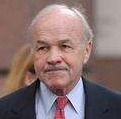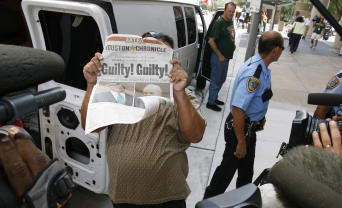Ken Lay yesterday finished his six days on the witness stand, and by all accounts he was awful. From the Financial Times: During his 15 years at the top, [Ken Lay] cultivated an image as a leader of the philanthropic community, the go-to man for corporate Houston who drove the revival of downtown.
So it came as a shock this week and last, when the public saw a different side of Mr Lay on the witness stand in his fraud and conspiracy trial.
He was snide with George Secrest, his own lawyer, making faces and asides and indicating annoyance with the questioning in which legal experts say he should have basked.
“Where are you going with this, Mr Secrest?’’ he asked at one point.
That's right, he was snide with his own lawyer. From the Houston Chronicle: What struck lawyers on the sidelines was not his surly manner with prosecutor John Hueston on cross-examination, but his grouchiness and discomfort at times dealing with defense attorney George "Mac" Secrest, who took the assignment while lead defender Michael Ramsey recovers from vascular surgery.
"I've never seen the transformation of a witness from grandfather to Richard Nixon in a day," lawyer Brian Wice said.
 Ken Lay could have argued that the company was brought down by faulty but honest management decisions, unfortunate perhaps but hardly criminal. Instead, he continued to insist that there was nothing fundamentally wrong with Enron -- a much harder case to make. From the New York Times:
Ken Lay could have argued that the company was brought down by faulty but honest management decisions, unfortunate perhaps but hardly criminal. Instead, he continued to insist that there was nothing fundamentally wrong with Enron -- a much harder case to make. From the New York Times: By trying to resurrect his reputation rather than counter the charges against him, Mr. Lay, 64, put front and center the question of whether he bore responsibility for mismanaging Enron.
Yet he steadfastly refused to accept responsibility for any decision that might have contributed to the fall of Enron. Instead, he liberally sprinkled blame on a market panic caused by short-sellers, The Wall Street Journal, the bursting of the technology boom, the terrorist attacks of Sept. 11 and, most of all, the schemes hatched by the former chief financial officer, Andrew S. Fastow.
Ken Lay was unprepared to deal with some uncomfortable facts. As the company was going south in 2001, he was secretly selling $70 million in Enron shares while telling anyone who would listen that they should buy the company's stock. Lay's excuse that he was forced to sell his shares because of margin calls was punctured by prosecutor John Hueston who demonstrated that Lay was selling his Enron shares even when he wasn't forced to by his creditors and had other assets at his disposal.
It also came out that Ken Lay had joined Jeff Skilling in investing in a company that did business with Enron, which was in violation of the company's ethics policy (and possibly federal securities law). Lay seized the opportunity to demonstrate his lack of concern for the questionable ethics of self-dealing: When questioned by Mr. Hueston on Tuesday about a $160,000 personal investment he made in a photo-sharing company that did more than 80 percent of its business with Enron, Mr. Lay called suggestions of impropriety "form over substance."
Rules, he said, "are important, but you should not be a slave to rules, either."
This is relatively small potatoes compared to the brazen scheming of CFO Andrew Fastow. But if the the top two execs see no problem with such self-dealing, it becomes easier to understand how Fastow could have been given the green light on his dealings. In this light, Fastow's deals are exceptional only in the number of zeros involved (as well as the complexity of the schemes). But prosecutors were able to establish that self dealing was accepted at the top of the company.
The trial, which some expected to descend into an endless discussions about arcane accounting rules, has produced more than its share of human drama. Who would have thought that the hot-tempered Andrew Fastow would end up his testimony as a sypathetic figure, and that the affable Ken Lay would come across as a snarling, arrogant and self-destructive?
In Ken Lay's mind, the rest of the world still doesn't get it.
Photo: Richard Carson/Reuters










